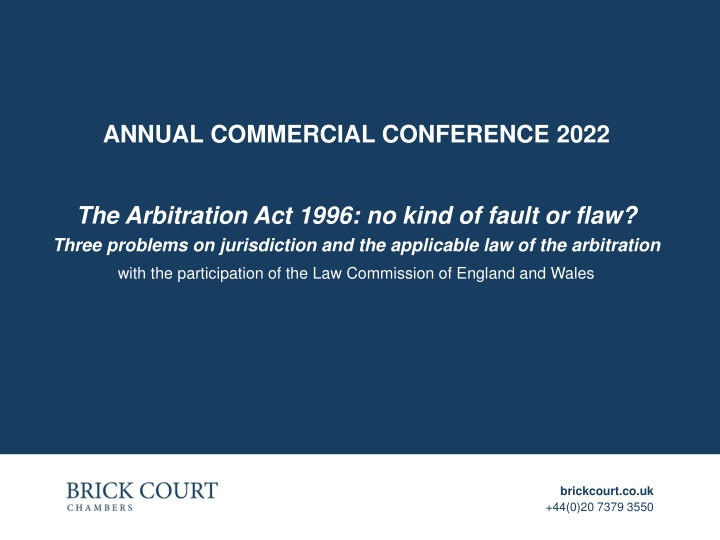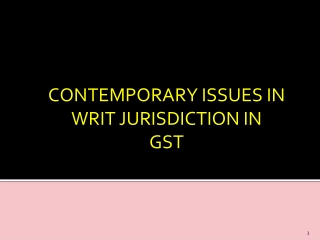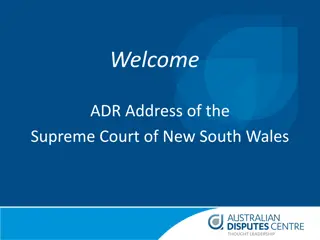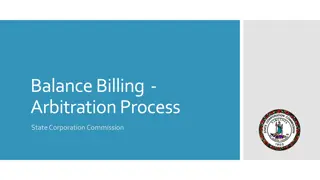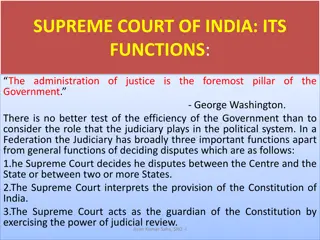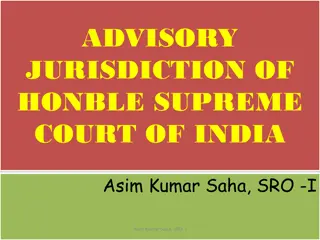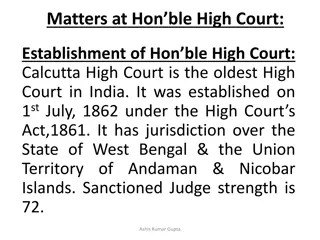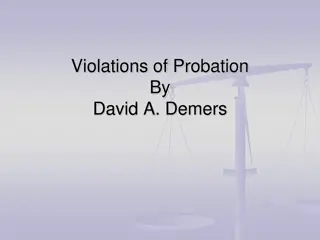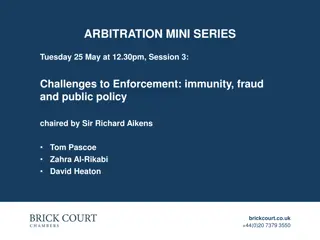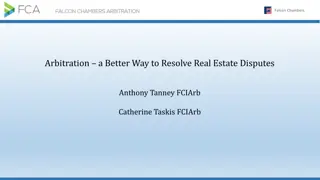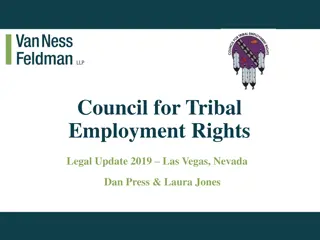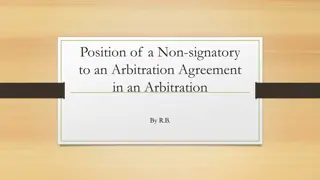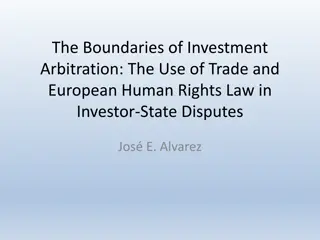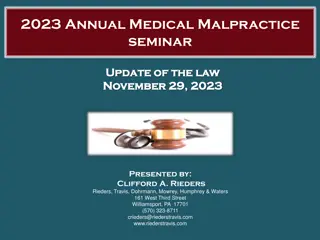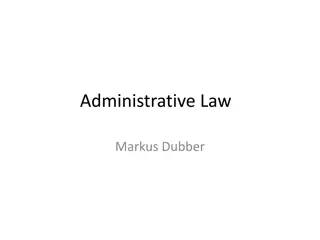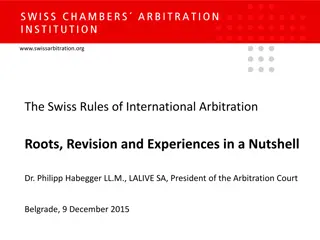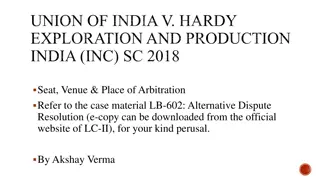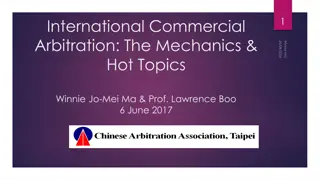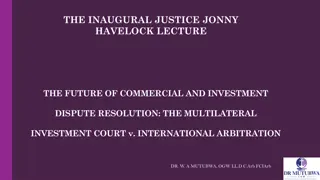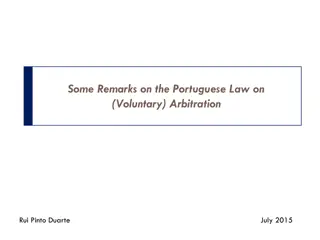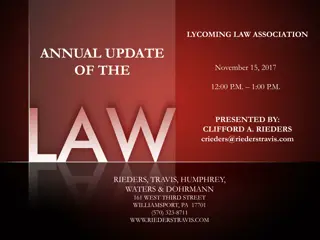Annual Commercial Conference 2022: Challenges in Arbitration Jurisdiction
The Annual Commercial Conference 2022 focuses on the Arbitration Act of 1996, exploring challenges and nuances in jurisdiction and applicable laws. The event features distinguished speakers and panelists discussing key issues related to substantive jurisdiction challenges in arbitral proceedings.
Download Presentation

Please find below an Image/Link to download the presentation.
The content on the website is provided AS IS for your information and personal use only. It may not be sold, licensed, or shared on other websites without obtaining consent from the author.If you encounter any issues during the download, it is possible that the publisher has removed the file from their server.
You are allowed to download the files provided on this website for personal or commercial use, subject to the condition that they are used lawfully. All files are the property of their respective owners.
The content on the website is provided AS IS for your information and personal use only. It may not be sold, licensed, or shared on other websites without obtaining consent from the author.
E N D
Presentation Transcript
ANNUAL COMMERCIAL CONFERENCE 2022 The Arbitration Act 1996: no kind of fault or flaw? Three problems on jurisdiction and the applicable law of the arbitration with the participation of the Law Commission of England and Wales brickcourt.co.uk +44(0)20 7379 3550
ANNUAL COMMERCIAL CONFERENCE 2022 The Arbitration Act 1996: no kind of fault or flaw? Three problems on jurisdiction and the applicable law of the arbitration with the participation of the Law Commission of England and Wales Opening remarks by Vernon Flynn KC, Brick Court Chambers Opening remarks by Sir Nicholas Green, Chairman of the Law Commission brickcourt.co.uk +44(0)20 7379 3550
ANNUAL COMMERCIAL CONFERENCE 2022 The Arbitration Act 1996: no kind of fault or flaw? Three problems on jurisdiction and the applicable law of the arbitration with the participation of the Law Commission of England and Wales Session one Introduction of the panel by the chair, Sir Christopher Clarke, Brick Court Chambers Introduction of the topic by Allan Cerim, Brick Court Chambers Panellists Hilary Heilbron KC, Brick Court Chambers Justice Judith Prakash, Justice of the Court of Appeal, Supreme Court, Singapore Professor George Bermann, Professor, Colombia Law School, Director of Center for International Commercial and Investment Arbitration brickcourt.co.uk +44(0)20 7379 3550
SESSION ONE Section 67 A party to arbitral proceedings may (upon notice to the other parties and to the tribunal) apply to the court (a) challenging any award of the arbitral tribunal as to its substantive jurisdiction; or (b) for an order declaring an award made by the tribunal on the merits to be of no effect, in whole or in part, because the tribunal did not have substantive jurisdiction. A party may lose the right to object (see section 73) [participating without objection] and the right to apply is subject to the restrictions in section 70(2) and (3) [exhausting other routes and 28 day time limit etc.] The Law Commission proposal: (1) where a party has participated in arbitral proceedings, and has objected to the jurisdiction of the arbitral tribunal; and (2) the tribunal has ruled on its own jurisdiction in an award, Then any subsequent challenge under section 67 should be by way of an appeal and not a rehearing. brickcourt.co.uk +44(0)20 7379 3550
ANNUAL COMMERCIAL CONFERENCE 2022 The Arbitration Act 1996: no kind of fault or flaw? Three problems on jurisdiction and the applicable law of the arbitration with the participation of the Law Commission of England and Wales Session two Introduction of the panel by the chair, Lord Phillips, Brick Court Chambers Introduction of the topic by Jessie Ingle, Brick Court Chambers Panellists Sir Richard Aikens, Brick Court Chambers Anne-V ronique Schlaepfer, Partner, White & Case (Geneva) Professor Pierre Mayer, Professor of Law; Partner, Mayer Greenberg Avocats (Paris) brickcourt.co.uk +44(0)20 7379 3550
SESSION TWO It is 25 years since the 1996 Act came into force and it s time to review it. The issue of the arbitral tribunal s jurisdiction is central to all commercial arbitrations. For the first time in English arbitration law, the 1996 Act introduced the doctrine of competence-competence, permitting the arbitral tribunal to decide, definitively, its own substantivejurisdiction , although the decision is open to challenge in court. The two issues that my short talk consider are: (1) whether there too many ways in which jurisdiction of the arbitral tribunal can be challenged in court as well as before the tribunal under the Act? (2) Is too much emphasis given to the court making decisions on jurisdiction rather than the arbitral tribunal? This leads to the question: does the current statutory framework need simplification or clarification? A personal view: Sir Richard Aikens brickcourt.co.uk +44(0)20 7379 3550
When can jurisdiction be challenged? At least EIGHT ways in which substantive jurisdiction can be brought into question under Pt 1 of the Act. The general principle, unless the parties agree otherwise, is that the arbitral tribunal may rule on its own substantivejurisdiction : s.30(1) of the Act. This principle of competence-competence was thus adopted in English arbitration law for the first time. In Fiona Trust and Holding Corp v Privalov in the CA, [2007] Bus LR 686 at [34], Longmore LJ in commenting on s.9 and s.72 of the Act, said that it will, in general, be right for the arbitrators to be the first tribunal to consider whether they have jurisdiction to determine the dispute . The HL did not dispute that proposition. Does the scheme of the Act give the arbitral tribunal primacy in deciding whether it has jurisdiction to decide the dispute in question? As Merkin & Flannery point out in The Arbitration Act 1996 at p323, there are at least eight ways in which an arbitral panel s substantivejurisdiction (the phrase used in s.30(1)) can be brought into question under the Act. I am not going to consider two of them: (1) when an application is made to court under s.44 of the Act for interim measures or an injunction, (when, obviously, an application could be challenged on the basis that the arbitral tribunal did not have jurisdiction); and (2) when there is a challenge to an application for leave to enforce an arbitration award as a judgment: s.66(3); again clear that could be challenged on the ground of no jurisdiction to make an award. 7
First way of challenging the jurisdiction of the arbitration tribunal: in the course of an application for a stay of proceedings: s.9(1) and (4) of the Act Section 9(1). Application to the court to stay court proceedings; one party alleges an arbitration agreement between them which covers the dispute between them. (In Fiona Trust the charterers had applied for a stay of the court proceedings under s.9. That was resisted on the ground that the arbitration agreement had been vitiated because contracts obtained by bribes). Under s.9(1) the court has first to decide (a) whether there is a valid arbitration agreement between the parties and (b) whether it covers the dispute in question. The standard of proof issue is difficult. (See discussion by Aikens LJ in JSC Aerofloat Russian Airlines v Beresovsky [2013] 2 Lloyd s Rep 242 at [73]-[80]). Basic position is that party wanting a stay has to prove on a balance of probabilities (on the available materials) that there is an arbitration agreement and it covers the disputes in question. This appears to be final? BUT should the court s decision be final? Nothing left for the arbitral tribunal to do? If the applicant gets over the s.9(1) hurdles, the respondent to the stay application under s.9 can assert that the arbitration agreement is null and void or inoperative or incapable of being performed , and, if so, the court will refuse a stay: s.9 (4). S.9(4) is based on the NYC Art II(3), which says that there must be a stay unless [the court] finds that the said agreement is null and void, inoperative or incapable of being performed . The standard of proof under s.9(4) is also balance of probabilities . So, if proved, the finding of the court under s.9(4) will be final. It will be the end of the arbitration. After Fiona Trust, the circumstances in which a stay will not be granted are likely to be confined to a small number of situations where (i) not proved a valid arbitration agreement exists; or (ii) one of circumstances under s.9(4) proved. Section 9(1) and (4) have to remain, to fulfil Art II(3) NYC. BUT should the court be more ready to send disputed issues off to the arbitral tribunal to sort out? That is the position under s.5 of the Mauritius International Arbitration Act 2008 (as amended in 2013). Where a party contends there is an arbitration agreement, the court will transfer the matter to arbitration, unless the other side shows, on a prima facie basis, that a very strong probability that the arbitration agreement is null and void, inoperative incapable of being performed. 8
Second situation when jurisdiction issues may arise: when there is an application to the court to appoint an arbitrator under s.18 of the Act. If the parties have not agreed a procedure to deal with circumstances where one or other fails to appoint a tribunal, then a party can apply to the court to exercise powers dealing with the appointment of the tribunal: s.18(1) and (2) of the Act. The court would have to be satisfied, at least on a good arguable case basis, that there is a valid arbitration agreement between the parties covering the dispute in question before it could exercise powers under this section. The party opposing the appointment of a tribunal under s.18 might allege positively that there was no valid arbitration agreement. If the court concluded definitively that there was no valid arbitration agreement, that, presumably would be the end of the arbitration. If the court was satisfied to the good arguable case level, that an arbitration agreement existed, then made an appointment under s.18(3), then, presumably, a party asserting that there was no valid arbitration agreement could still challenge it before the arbitral tribunal. And that decision could, itself, be challenged in s.67 proceedings. Or the challenging party could take no part in the arbitration and then challenge any award on the ground of no substantivejurisdiction , using s.67 as that right is preserved under s.72(2)(a). This retains the primacy of the arbitral tribunal. So, suggest no change to s.18. 9
Third situation where the substantive jurisdiction of the arbitral tribunal may be challenged: before the tribunal itself: s.31 of the Act. Because the arbitral tribunal has the competence to rule on its own jurisdiction, a party can challenge that jurisdiction before the tribunal. The way of doing so is set out in s.31, which is a mandatory provision: the parties cannot opt out of it. The jurisdictional challenge has to be made (generally) not later than the time the challenging party takes the first step in the proceedings to contest the merits of any matter in relation to which he challenges the tribunal s jurisdiction : s.31(1). Section 31(4) of the Act says that where an objection is take to the tribunal s substantive jurisdiction and the tribunal has power to rule on its jurisdiction (because the parties have not agreed otherwise), then the tribunal may (a) rule on the matter in an award as to jurisdiction, or (b) deal with the objection in its award on the merits. And s.31(4) makes it clear that if the parties agree on a particular procedure, the tribunal has to follow it. However, in LG Caltex Ltd v China Petroleum Corp [2001] 1 WLR, Lord Phillips MR stated, at [70] and [71], that a tribunal can only deal with the jurisdictional objection in an award on the merits if it concludes that has jurisdiction. (Pill and Keene LJJ agreed; Aikens J overruled). I respectfully ask: is that right? Is that how the wording of s.31(4) is to be interpreted? What if the parties agreed that jurisdictional objections should be dealt with in the award on the merits, because they do not want to divide and possibly incur more costs? The tribunal has to follow that, per s.31(4). What if it then holds that it had no jurisdiction? Is it turned into an award on jurisdiction only? It seems to me that the course adopted by the very experienced arbitrator in Caltex, which was to have one award, where he held that the parties had not concluded the contracts, there was no jurisdiction and the claims for breach of contracts therefore failed on the merits, was actually correct and in accordance with the wording of s.31(4). And is consistent with s.73 (losing the right to challenge). Is the CA view on the construction of s.31(4) in Caltex wrong? Should it be reversed by statute, or should the wording of s.31(4) be made clearer? 10
Fourth situation where a jurisdiction issue can arise: a party applies to the court under s.32 for the determination of a preliminary point on the substantive jurisdiction of the tribunal. This section provides for a determination by the court of a jurisdictional issue relating to a tribunal. BUT the court can only intervene in limited circumstances: (a) if all the parties agree in writing. Presumably they can do so even before an arbitral tribunal is constituted. Or (b) if the arbitration tribunal has been constituted, and it gives permission for the court to decide an issue on substantivejurisdiction AND the court is satisfied that the determination of the question is likely to produce substantial savings in costs; and that the application was made without delay and that there is good reason why the matter should be decided by the court: s.32(2). If the arbitral tribunal has been constituted, it can carry on with the proceedings and make an AWARD whilst an application to the court is pending under s.32: see s.32(4). So if the arbitral tribunal was swift, presumably it could make an award on its own jurisdiction in advance or the court doing so? If it did, that could presumably be challenged under s.67 (or s. 72 if the party that challenged jurisdiction took no part in those arbitral proceedings). If the court decides the matter under s.32(2) its decision is on a balance or probabilities. It is final in that sense. No appeal to the CA without the leave of the court at first instance, which has to be satisfied that there is a point of law which is one of general importance: OR (general get out clause)- the point is one which for some other special reason should be considered by the Court of Appeal : s.32(6). Is this provision a good idea? There is no equivalent in the Model Law. The DAC thought it should only be rarely invoked. AND there are VERY few reported cases on it. See: eg VTB Commodities Trading DAC v JSC Antipinsky Refinery [2019] EWHC 3292 Comm, Teare J. Is s.32 worth keeping? Is an unnecessary power given to the court, when primacy should be given to the tribunal to decide jurisdiction. Should it go? 11
Fourth situation when jurisdiction can be challenged: following an Award, if there a challenge to the award on the ground that the tribunal lacked substantive jurisdiction : s.67(1). An application under s.67 can only be made if all pre-existing arbitral means of challenge have been exhausted: ss.67(1) and 70(2). As already noted, (s.31(4)), an award can be either one as to jurisdiction or on themerits . Whether an award is of one or other type can give rise to differing views on the same facts: see the opposite view of Aikens J (merits) and Lord Phillips MR (jurisdiction only) in LG Caltex Gas Co Ltd v China National Petroleum Corp [2001] 1 WLR 1892 (CA). There was also an issue of fact in that case on whether the parties had entered into an ad hoc agreement that the sole arbitrator could deal with issues of jurisdiction. Aikens J said they had; the CA disagreed. But both courts agreed that if the parties had done so (without reservation) then the tribunal s decision on jurisdiction was final and any challenge in court under s.67 would fail: [50] of the CA judgment, although, strictly speaking, the CA statement is obiter, as I had concluded, on the facts, there was no ad hoc agreement. It is surely correct that an arbitral tribunal s decision as to its jurisdiction can be challenged in court proceedings. The procedure (full rehearing or review?) has already been considered. I add my voice to retaining full rehearing. It is too easy for self-serving arbitral tribunals to say yes there is jurisdiction . What would be the test if only a review: would the decision have to be obviouslywrong ? That could cause injustice. So: keep section 67 as it is. And confirm (in the LC s final report?) the obiter statement of the CA in Caltex on the effect of an ad hoc agreement on the tribunal deciding jurisdictional issues. 12
Fifth situation where the court can rule on jurisdiction: where a person has taken no part in the arbitration because it questions whether there is a valid arbitration agreement, the tribunal has been properly constituted, or the matters have been submitted to arbitration in accordance with the arbitration agreement: s.72 of the Act. Although this provision has no equivalent in the Model Law, the DAC regarded it as vital . A person who takes no part in the arbitral proceedings can invoke s.72(1) either before any award (on jurisdiction or the merits) has been made; or by using s. the s.67 procedure after an award has been made. Section 72 states that it can grant a declaration, injunction or other appropriate relief . In Law Debenture Trust v Elecktrim [2005] 2 Lloyd s Rep 755, Mann J considered the circumstances in which s.72 could be invoked and reviewed other first instance cases. It was a rather special case because there was an option on one party to have arbitration or court proceedings. In Fiona Trust, in the CA, Longmore LJ (giving the judgment of the court) said that, despite the existence of s.72, the court should, in the light of section 1(c) of the 1996 Act, be very cautious about agreeing that its process should be so utilised. If there is a valid arbitration agreement, proceedings should not be launched under section 72(1)(a) at all . This probably means that the court should only be prepared to invoke its powers under s.72 in very clear cases, where no detailed investigation or evidence is needed to demonstrate that there is no arbitration agreement. If more detailed investigation is needed, then, the matter should be left to the arbitral tribunal to deal with. That upholds the primacy of the tribunal dealing with matters not the court. If it s a jurisdictional issue within s.72(1)(a), the party takes no part in the arbitration, but the tribunal rules on jurisdiction, it can be challenged in relation to him under s.67: s.72(2)(a). In practice, s.72 cases are very rare. Is it really as vital as the DAC thought? Isn t Longmore LJ s statement sound. Is s.72 consistent with competence-competence. Repeal it? 13
Conclusions: are there any faults or flaws? Section 9(1) and(4). Needs clarification so as to avoid having the possibility of costly and lengthy procedures before the court to deal with whether or not any arbitration agreement exists at all. Suggested wording in the operative section s.9(4) On an application under this section, if the applicant contends that an arbitration agreement exists and covers the dispute in question, the court shall grant a stay unless satisfied that the arbitration agreement is null and void, inoperative or incapable of being performed . That avoids long court hearings on existence of arbitration agreement AND is consistent with NYC Art. II(3). Section 18 needs no changes. Section 31(4): POSSIBLE CLARIFICATION? Either (i) confirm Caltex interpretation by adding, in s.34(2)(a) rule against jurisdiction in an award as to jurisdiction, or (b) rule in favour of jurisdiction in its award on the merits ; OR reverse Caltex, so (ii) amend s.31(4)(b) to read rule on the matter in its award on the merits . Repeal s.32. No need for it; not used; detracts from supremacy of the arbitral tribunal. S.67. Keep as it is. S. 72. Retain but confirm agreement (in the LC s final report?) with Longmore LJ s statement in Fiona Trust about use of s.72 in general, and s.72(1)(a) in particular. 14
ANNUAL COMMERCIAL CONFERENCE 2022 The Arbitration Act 1996: no kind of fault or flaw? Three problems on jurisdiction and the applicable law of the arbitration with the participation of the Law Commission of England and Wales TEA PLEASE RETURN BY 3.15pm brickcourt.co.uk +44(0)20 7379 3550
ANNUAL COMMERCIAL CONFERENCE 2022 The Arbitration Act 1996: no kind of fault or flaw? Three problems on jurisdiction and the applicable law of the arbitration with the participation of the Law Commission of England and Wales Session three Introduction of the panel by the chair, Lord Hoffmann, Brick Court Chambers Introduction of the topic by Andris Rudzitis, Brick Court Chambers Panellists Salim Moollan KC, Brick Court Chambers Professor Christophe Seraglini, Professor of Law; Partner, Freshfields (Paris) Dr Michele Potest , Partner, L vy Kaufmann-Kohler (Geneva) brickcourt.co.uk +44(0)20 7379 3550
ANNUAL COMMERCIAL CONFERENCE 2022 The Arbitration Act 1996: no kind of fault or flaw? Three problems on jurisdiction and the applicable law of the arbitration with the participation of the Law Commission of England and Wales General session Reports from each panel by Kyle Lawson, Zahra Al-Rikabi and Emilie Gonin, Brick Court Chambers and discussion Closing remarks by Professor Sarah Green, Law Commission Closing remarks by Mark Howard KC, Joint Head of Brick Court Chambers IF YOU WISH TO COMMENT ON OR RESPOND TO THE LAW COMMISSION S CONSULTATION PLEASE EMAIL: arbitrationreform@brickcourt.co.uk brickcourt.co.uk +44(0)20 7379 3550
ANNUAL COMMERCIAL CONFERENCE 2022 The Arbitration Act 1996: no kind of fault or flaw? Three problems on jurisdiction and the applicable law of the arbitration with the participation of the Law Commission of England and Wales DRINKS IN THE BENJAMIN FRANKLIN ROOM brickcourt.co.uk +44(0)20 7379 3550
